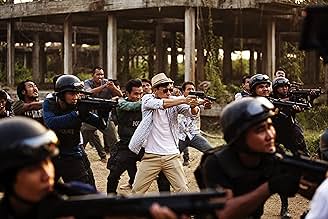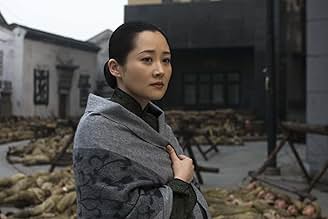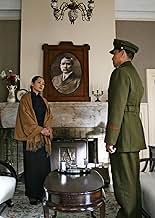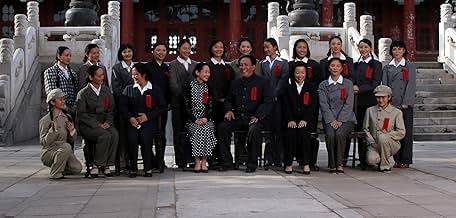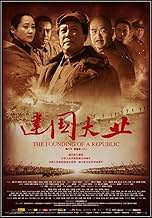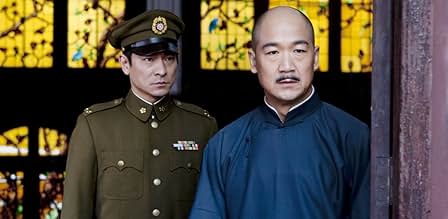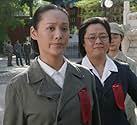Ajouter une intrigue dans votre langueInspired by true events, Founding of a Republic weaves a rousing tale of one man who fought against the tyranny of a ruler and led his people in battle in the ultimate sacrifice for his coun... Tout lireInspired by true events, Founding of a Republic weaves a rousing tale of one man who fought against the tyranny of a ruler and led his people in battle in the ultimate sacrifice for his country.Inspired by true events, Founding of a Republic weaves a rousing tale of one man who fought against the tyranny of a ruler and led his people in battle in the ultimate sacrifice for his country.
- Réalisation
- Scénario
- Casting principal
- Récompenses
- 15 victoires et 7 nominations au total
Avis à la une
The acting is perfect. It's a star studded cast. They got all the biggest Chinese stars to do this. And you can tell. Both Jackie Chan and Jet Li have minor supporting roles. Their stars aren't bright enough to crowd out the better talent. So that's saying a lot. Great dialogue, as well. Anyway, cool to see a film like this where USA is the villain. While I'm in no way pro-Chinese. I do like variety and shifts in perspective.
There's zero soul searching going on in this film. In this film Mao is the best guy ever. Truly loved and respected by all who know him. Although Chiang Kai Shek didn't actually kick a dog on screen... you just knew he did off camera. This is a bad man.
I'm a history buff. So I've read biographies about all these people. They didn't need to do it this way. The Chinese communist party (ou tin the real world) already declared Mao an incompetent leader, and purged all his "henchmen". They did that in the 70'ies. So there should be zero contemporary controversy, in China, to do an accurate portrayal of both Chiang Kai Shek and Mao. But they chose to do it this way instead. Which took me a bit out of the drama. It's fun when the American ambassador is shown as a coward who doesn't stick up for his friends. Again... just nice to see, for a change, a high quality film that doesn't endlessly repeat the Hollywood messages of America's perfection.
They do a quite good job dramatising, what essentially just is, a series of talks where a bunch of elderly men negotiate at various tables. There is a lot of smoking, and talking about smoking. I never figured out the symbolism of that. Or perhaps it just was historically accurate? The film does get a bit boring at times. There's a fun segment where Mao has taken sleeping pills but needs to get to safety in a bomb shelter. But he's high as a kite from the pills, and has no intention of cooperating with his handlers, who end up having to carry him by force on a stretcher (not a spoiler, since everybody who knows anything about history knows Mao survived).
They do show some of the fighting. But this isn't a war movie. This film is only about the, behind the scenes, negotiating that later led to what became the formation of the republic. It spends a lot of time explaining why and how each member of the first Central Committee was elected. Which might be more fun if I knew more about recent Chinese history. Most of these names mean nothing to me. But it's pretty clear the viewers are supposed to be impressed. Which is another thing I like about it. Just like American propaganda films, it's shot for a domestic audience. It's obvious that this is shot for a Chinese audience, and only a Chinese audience. So they don't bother explaining, lots of stuff, you just have to know. I've read a lot of history, so I could mostly follow it. But far from everything. I did a lot of pausing and looking up stuff on Wikipedia. I must admit that I liked that aspect of it. It adds to the immersion, somehow. Despite it's flaws I did learn a lot, which I think is what's most important when it comes to historical dramas.
The movie objective is to talk about the foundation of PRC and the film does well, have great actors, its good in their proposal. If you want to see costumes, behaviour of that times see the movie.
In much of the propaganda that pervades previous characterizations of Chiang and his Nationalist forces, the Chinese Communists have tended to portray the Chinese civil war as one of black v white, good v evil, with victorious communist forces "liberating" the people from an evil regime. These words still appear today when it is advantageous to Chinese communists' interest. But in this film Chiang seems reflective, fair-minded and concerned over excesses in his own regime--a rather positive image.
Mao is treated to several revisions, appearing jovial, tolerant, and even permissive of some forms of capitalism, the latter something Mao never actually was in his revolutionary days. Indeed, there is little revolutionary fervor in Mao's dialogue in this film, a fervor which in real life permeated Mao's thinking. This seems deliberate, as these ideas would accord little with the current regime in Beijing. In one scene where Mao is shown in an avuncular, loving role with children, even though in real life Mao abandoned his children to pursue his broad revolutionary ambitions.
While KMT excesses are detailed, including several assassinations, there is absolutely no mention of CCP atrocities committed during the Chinese civil war. And, while KMT violations of the interim treaty between the two sides are highlighted, there is no mention of CCP violations of the same pre-civil war accords.
While most of the film is richly detailed in costumes and settings, the special effects are not very realistic, with several airplane scenes being utterly unconvincing as they are obvious CGI. The film is a product of Chinese film makers, but political interests in Beijing factored heavily in its production. I doubt that the movie will generate much interest outside of China.
Le saviez-vous
- AnecdotesThis movie was made to coincide with the 60th Anniversary of the Chinese Communist Party founding of China. This movie boasts the most number of China's movie stars in one movie. Many of the top stars were invited to star as leads, supporting characters, or just cameo in the movie, reportedly including some of the top Chinese stars like Jackie Chan and Jet Li, who only have one shot or one line in the movie.
- Citations
Li Ji-chen: I heard you intend to resign. Even if you were to resign, at least wait till after the capitulation ceremony in Nanjing. You helped defeat the Japanese. The ceremony can't do without a national hero like you.
Chen Shaokuan: If I don't resign, very soon I'll be blamed for the civil war. We fought against the country's enemy for 8 years. We've struggled, we've fought all, nothing more need be said. And now that we've won, we're still warring. Against whom ? Chinese people fighting Chinese people... this kind of job, I do not want.
Meilleurs choix
- How long is The Founding of a Republic?Alimenté par Alexa
Détails
- Date de sortie
- Pays d’origine
- Langues
- Aussi connu sous le nom de
- Đại Nghiệp Kiến Quốc
- Lieux de tournage
- Sociétés de production
- Voir plus de crédits d'entreprise sur IMDbPro
Box-office
- Montant brut mondial
- 1 035 741 $US
- Durée
- 2h 18min(138 min)
- Couleur
- Mixage
- Rapport de forme
- 2.35 : 1

